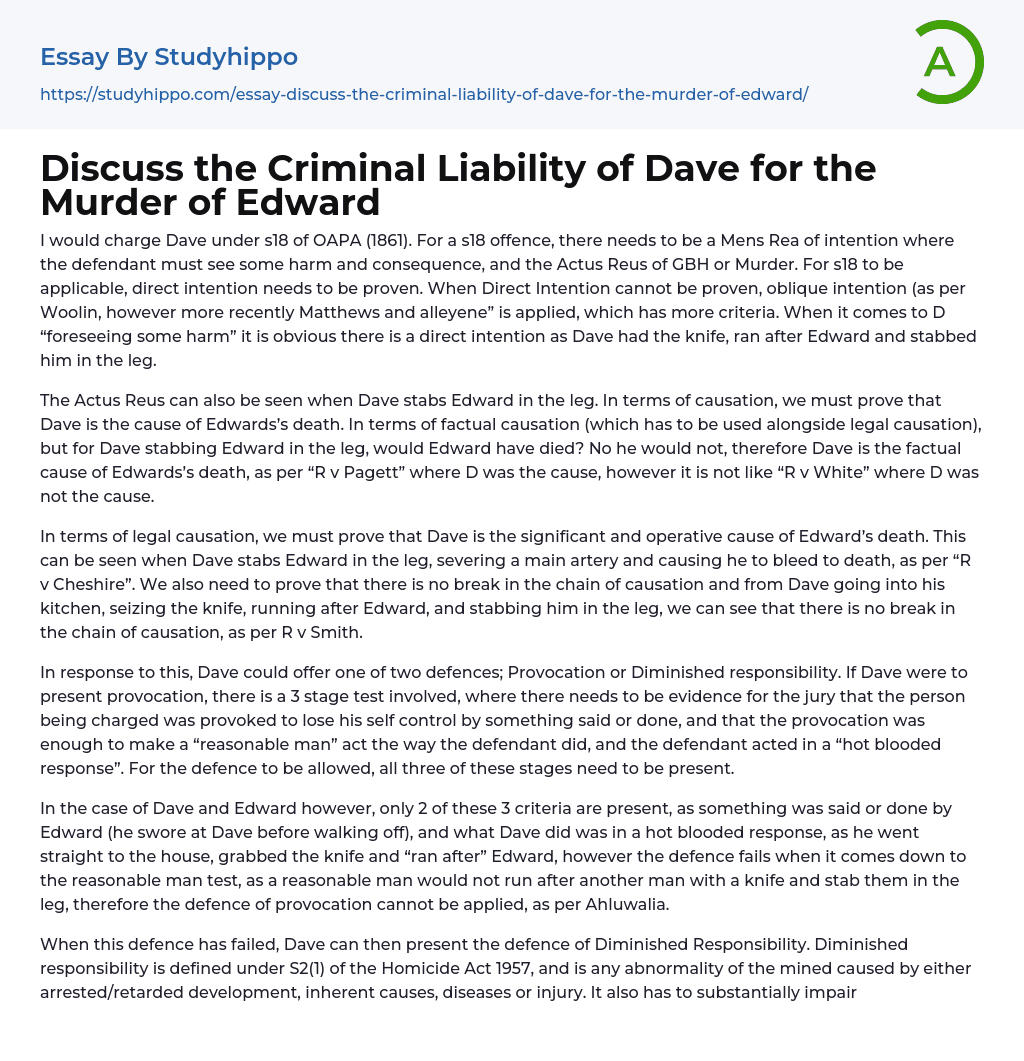

Criminal Liability on the Example of a Case Essay Example
Discuss the Criminal Liability of Dave for the Murder of Edward. I would charge Dave under s18 of OAPA (1861). For a s18 offence, there needs to be a Mens Rea of intention where the defendant must see some harm and consequence, and the Actus Reus of GBH or Murder. For s18 to be applicable, direct intention needs to be proven. When Direct Intention cannot be proven, oblique intention (as per Woolin, however more recently Matthews and alleyene” is applied, which has more criteria. When it comes to D “foreseeing some harm” it is obvious there is a direct intention as Dave had the knife, ran after Edward and stabbed him in the leg.
The Actus Reus can also be seen when Dave stabs Edward in the leg. In terms of causation, we must prove that Dav
...e is the cause of Edwards’s death. In terms of factual causation (which has to be used alongside legal causation), but for Dave stabbing Edward in the leg, would Edward have died? No he would not, therefore Dave is the factual cause of Edwards’s death, as per “R v Pagett” where D was the cause, however it is not like “R v White” where D was not the cause.
In terms of legal causation, we must prove that Dave is the significant and operative cause of Edward’s death. This can be seen when Dave stabs Edward in the leg, severing a main artery and causing he to bleed to death, as per “R v Cheshire”. We also need to prove that there is no break in the chain of causation and from Dave going into his kitchen, seizing the knife, running
after Edward, and stabbing him in the leg, we can see that there is no break in the chain of causation, as per R v Smith.
In response to this, Dave could offer one of two defences; Provocation or Diminished responsibility. If Dave were to present provocation, there is a 3 stage test involved, where there needs to be evidence for the jury that the person being charged was provoked to lose his self control by something said or done, and that the provocation was enough to make a “reasonable man” act the way the defendant did, and the defendant acted in a “hot blooded response”. For the defence to be allowed, all three of these stages need to be present.
In the case of Dave and Edward however, only 2 of these 3 criteria are present, as something was said or done by Edward (he swore at Dave before walking off), and what Dave did was in a hot blooded response, as he went straight to the house, grabbed the knife and “ran after” Edward, however the defence fails when it comes down to the reasonable man test, as a reasonable man would not run after another man with a knife and stab them in the leg, therefore the defence of provocation cannot be applied, as per Ahluwalia.
When this defence has failed, Dave can then present the defence of Diminished Responsibility. Diminished responsibility is defined under S2(1) of the Homicide Act 1957, and is any abnormality of the mined caused by either arrested/retarded development, inherent causes, diseases or injury. It also has to substantially impair the defendant’s mental responsibility for his or her actions (as per
Byrne). If a defence of diminished responsibility can be proven on a balance of probabilities, D will charged with manslaughter rather than murder.
In this case, it is evident that there is some form of abnormality of mind in the respect that Dave had “become obsessive about cleaning his car and ensuring that he could park it outside his house. ” If this wasn’t evidence enough that he was not your average “reasonable person”, He also “suffered great stress and became angry when he was prevented from doing either”. This is sufficient evidence for this defence as the Court of Appeal held that Abnormality of mind is wide enough to cover: the perception of physical acts and matters, and the ability to exercise willpower to control physical acts in accordance with that rational judgement.
As we can see, being obsessive over your car is not rational, and “obsessive” means it is impossible to control your own actions, therefore the defence of Diminished Responsibility is applicable to Dave. The most similar case to this was that of “Byrne” who was a sexual psychopath who claimed he had “irresistible desires” that he could not control. To conclude, I believe that Dave will not be charged with murder, but with manslaughter due to the defence of diminished responsibility. This means that the sentence carried is left wide open to the judge who can give him anything from 0 years to life.
- Federal government essays
- Armed Forces essays
- Confederate States Of America essays
- Federal Government Of The United States essays
- Fourteenth Amendment To The United States Constitution essays
- Governance essays
- Parliament essays
- Politics essays
- Jurisdiction essays
- Bureaucracy essays
- Separation Of Powers essays
- Congress essays
- President essays
- United States Congress essays
- Non-Commissioned Officer essays
- Appeal essays
- Revenge essays
- Corporate Governance essays
- Public Service essays
- Income Tax essays
- Supply essays
- Red Cross essays
- Democracy essays
- State essays
- Liberty essays
- Absolutism essays
- Reform essays
- Republic essays
- John Marshall essays
- Bourgeoisie essays
- Developed Country essays
- Elections essays
- International Relations essays
- Left-Wing Politics essays
- Monarchy essays
- Political Corruption essays
- Political Party essays
- Political Science essays
- Sovereign State essays
- United Nations essays
- World Trade Organization essays
- Contras essays
- Dictatorship essays
- Foreign policy essays
- Monarch essays
- Corruption essays
- Foreign essays
- Democratic Party essays
- European Union essays
- President Of The United States essays



